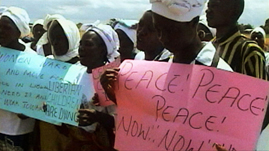Teachers' Domain - Digital Media for the Classroom and Professional Development
User: Preview


LEYMAH: April 1, 2003. I get this call from Asatu. She said, "The war is closing in. The war is getting worse and worse every day."
LEYMAH: We needed to do something more forceful, more dramatic.
ASATU at meeting: For us, religion is not a barrier for us.
LEYMAH: We decided to take a protest.
WIPNET radio announcement: Are you sick and tired of war? Come join the peace festival rally organized by women of Liberia…
LEYMAH: It was like, "Listen out to what we want to do next."
WIPNET radio announcement: …this Saturday at Sinqor airport, opposite fish market…
VAIBA: We went back to the bible. We saw what Esther did for her people, that she went in sackcloth and ashes, saying, "I mean it."
LEYMAH: Liberian women that love to do their hair and put on jewelries and make-up, were not allowed to do any of those things.
VAIBA: We wore plain white clothes with the hair tied. We wore the white, saying to people we were out for peace.
ASATU: We are determined, and nobody gonna deter us. We’re gonna find a strategic point, where Taylor’s gonna encounter us and give us some attention. And this is how we decided to sit at the fish market everyday. Thousands of women, including IDPs, internally displaced persons, went. It was the first time in our history in Liberia where Muslim women and Christian women were coming together.
LEYMAH: And we had a big banner that said, "The women of Liberia want peace now."
JANET: Charles Taylor said, "Those who think they can come out in the street to embarrass themselves, come out! I’m waiting for you. I said nobody, N-O-B-O-D-Y, nobody, will get into the street to embarrass my administration."
VAIBA: We were not afraid. My mother was like, "They will beat you people, they will kill you." And we said, "Well, if I should get killed, just remember me, that I was fighting for peace."
LEYMAH: By the time President Taylor was about to go to work, we were over 2,500 women under the blazing hot sun.
ASATU: We were lined up with our placards that we wanted peace, and no more war. This is how this song came about, “We want peace, no more war.” Our children are dying, we want peace. We are tired suffering, we want peace. We are tired running, we want peace.
ASATU: And then Taylor’s convoy came, and we were all there, singing, shouting.
LEYMAH: President Taylor’s convoy slowed down. He didn’t stop, he went on.
ASATU: We were there over a week, and still the president didn’t see reason to talk to us.
ASATU: Every morning we went there, we got to know one another. We started to empathize with one another.
LEYMAH: We were so desperate for peace, we were going to have a sex strike.
VAIBA: And we said to the women, "One way or the other you have a power as a woman, and that power is deny the man your sex. And tell him the reason you’re going to deny him. Look, if you have any power to put stop to the war, you go and do it."
LEYMAH: Men were the perpetrators of violence, so either by commission or omission, you were guilty.
ASATU: Some of them who went against it came back and confessed and said, "Let me tell you, you know I had no control, this happened." We said, "Then pick up from there."
LEYMAH: And their husbands were equally praying with them, because for them, the end of the war meant a good -- a beginning of enjoyment for us.
 Loading Standards
Loading Standards